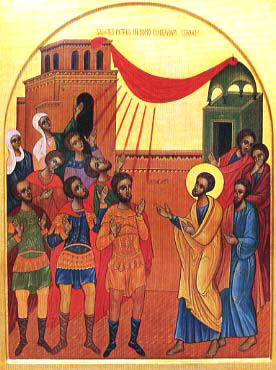 Decius is reported to have said that he would prefer to have a rival
emperor rather than a bishop in Rome. As long as such an emperor was in
full career, it was impossible for the Christians to elect a new pope.
But after over a year the Emperor was distracted by rebels, the persecution
slackened, and the Christians were able to elect a new pope. Cornelius,
their choice, was a Roman, a man of strong mind and strong character. He
was to need both.
Decius is reported to have said that he would prefer to have a rival
emperor rather than a bishop in Rome. As long as such an emperor was in
full career, it was impossible for the Christians to elect a new pope.
But after over a year the Emperor was distracted by rebels, the persecution
slackened, and the Christians were able to elect a new pope. Cornelius,
their choice, was a Roman, a man of strong mind and strong character. He
was to need both.
The winds of persecution had ceased to blow, but they left the bark
of Peter tossing in the swells. The persecution had been too much for many
Christians. Many had weakly denied Christ. Some had actually sacrificed
to idols. Others had bribed officials to say that they had. Now that peace
was restored, these poor weaklings came from all corners to try to get
back into the Church. The Pope had to face the double challenge of laxism
which too easily passed over the grievous offense and rigorism which repulsed
the poor people.
At first the laxists had to be checked. Many confessors, that is, those
who had confessed Christ before a heathen judge, took it upon themselves
to give the repentant apostates certificates entitling the holder to restoration
to communion. This degenerated into a regular traffic, and when St. Cyprian,
the bishop of Carthage, tried to stop it, a certain Novatus set up a dupe
of his named Felicissimus as antibishop and went off to Rome to get the
Pope's support. Comelius, however, was not deceived. He condemned the schism
and the laxist practices. The repentant apostates might indeed return to
communion but only after due penance.
This moderate regulation provoked the rigorists, and a man named Novatian
came to Rome and set himself up as antipope. He accused Comelius of having
bribed an official to say that he had denied Christ. No wonder Cornelius
wrote bitterly about Novatian in a letter to Bishop Fabius of Antioch.
St. Cyprian loyally backed the Pope. At this time he wrote the classical
treatise, "On the Unity of the Church."
Novatian the rigorist, oddly enough, joined hands with Novatus the
laxist. The movement they started spread into the East. It absorbed many
of the old Montanists. These people called themselves Cathari (Puritans).
The persecution once more flared up when a plague set the fanatical
populace to demanding death for the Christians. Emperor Trebonianus Gallus
yielded to the demand. This time the Christians were better prepared and
the shocking wave of apostasy which had marked the Decian persecution was
not repeated. Pope Cornelius kept his Romans in high morale. He was exiled
to Centum Cellae, the modern Civita Vecchia, and was martyred there in
253. He was buried in the Cemetery of Calixtus. The feast of St. Comelius,
together with that of his friend St. Cyprian, is kept on September 16.
Excerpted from "Popes
Through the Ages" by Joseph Brusher, S.J.

